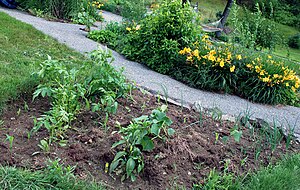1. Location, location, location! Different areas of your yard may have different chemical content. If you plant near a busy road, or an old building, you’re more likely to have chemicals leaking into your soil. Try to plant away from these and other hazards that might contain toxins.
 Home soil testing kit. (Photo credit: Wikipedia)2. Test your soil. You can’t get rid of harmful chemicals until you know what they are. You can collect samples of your soil (how many you need depends on the size of your garden) and send them to be tested. If you don’t know where to get soil tested, ask at your local nursery.
Home soil testing kit. (Photo credit: Wikipedia)2. Test your soil. You can’t get rid of harmful chemicals until you know what they are. You can collect samples of your soil (how many you need depends on the size of your garden) and send them to be tested. If you don’t know where to get soil tested, ask at your local nursery.3. Add mulch. When you add mulch, this not only helps conserve water and keep the soil from overheating, it also breaks down into organic matter. The organic material binds with harmful materials like lead instead of it binding with your plants.
4. Plant things that "eat" the bad stuff. For example, mustard will take lead out of your soil. Instead of eating the plants, just pull them and throw them away. This will take lead out of your soil and can be used for other harmful chemicals. This is actually a common practice called phytoremediation.
5. Avoid using chemicals. It may go without saying, but if you don’t want unnatural chemicals in your food, don’t put them on your garden. There are natural and safe ways to repel pests and fertilize your garden. This will help your soil stay healthy and make beautiful tasty veggies for years to come.
6. Use elevated beds. Toxic chemicals like lead generally leak down into the soil. So, if you put, fresh, clean soil on top of your old soil, it will remain safe as long as long as toxic chemicals can’t come in from the sides. Building an elevated bed will take some extra work in the beginning, but it will remain safe through the years.
7. Start a compost pile. It’s fairly simple to do: just throw all your organic waste, like grass clippings, fallen leaves, and kitchen waste, into a compost bin in your yard and turn regularly. Eventually this will break down into great organic material that will bind with the harmful chemicals to keep them out of your food.
 An early July new garden containing a variety of vegetables to help condition the soil and test the environment for susceptibility to wildlife pests. (Photo credit: Wikipedia)8. Plant some mushrooms. Mushrooms are decomposers, which means they break down old matter. In addition to turning trees to soil, they may also help break down toxins in your soil. You can do some quick research to determine which ones are right for you.
An early July new garden containing a variety of vegetables to help condition the soil and test the environment for susceptibility to wildlife pests. (Photo credit: Wikipedia)8. Plant some mushrooms. Mushrooms are decomposers, which means they break down old matter. In addition to turning trees to soil, they may also help break down toxins in your soil. You can do some quick research to determine which ones are right for you.9. Choose the proper veggies. Some veggies are perfectly safe, even if they’re grown in toxic soil. If you have toxic soil, or are in the process of cleaning it up, you can still grow above ground veggies, as long as you don’t eat the leaves. Avoid eating below ground vegetables like carrots. And always wash your vegetables before you eat them.
10. Grow veggies outside the soil. If nothing else works and your soil just isn’t safe for growing food, you can always grow fruits and veggies in pots and other small-space garden solutions like garden socks and hanging vegetable gardens. There are also a number of other gardening systems which don't use soil at all, like the new hydroponics
In most cases, most toxins can be removed from your garden soil within just a few years, if you follow the tips above. Maintaining a clean and healthy garden environment will make your garden sustainable and productive for years to come.

No comments:
Post a Comment